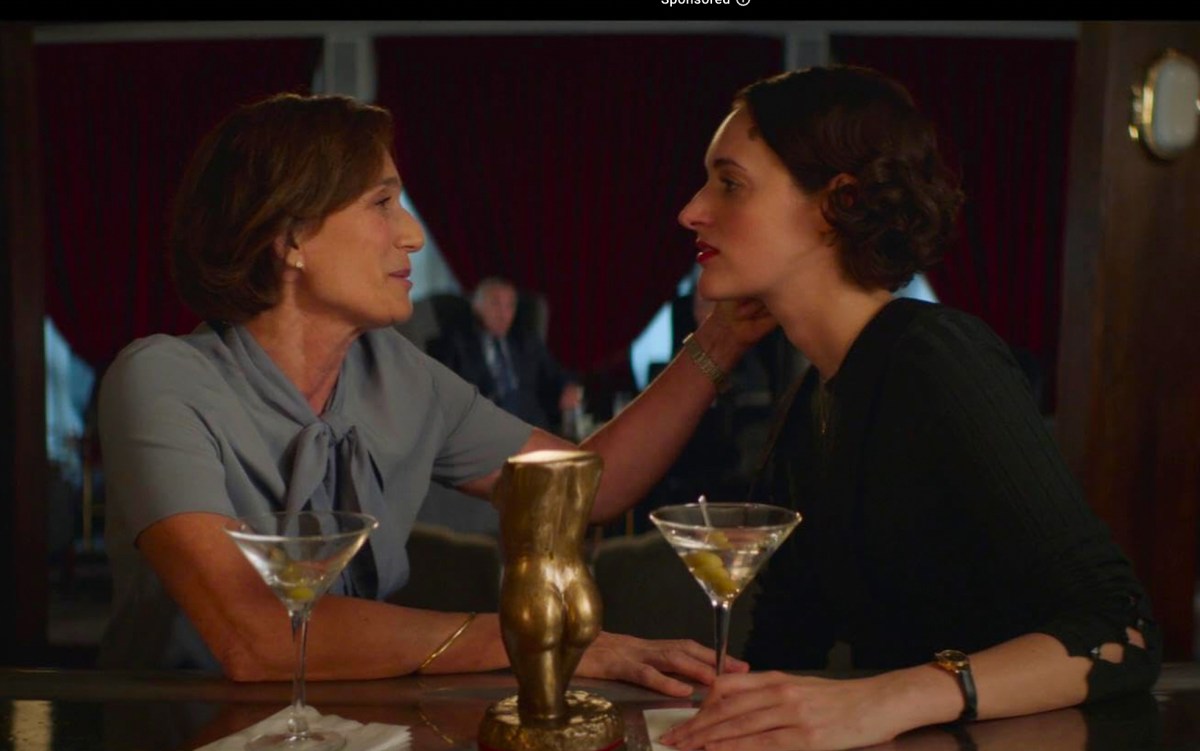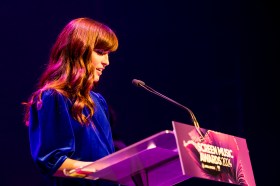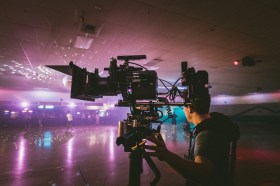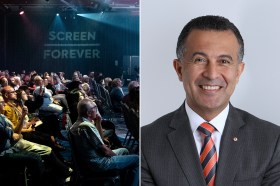If you’re looking for nuanced, diverse representations of menopause and perimenopause on screen, you’ll be searching hard. For a life stage of life that can be as physically and emotionally transformative as adolescence – and one that will affect about 50% of the human population (if they’re lucky to live long enough) – menopause is strangely absent from screen narratives.
We seek out stories to have our experiences confirmed and reflected upon, and to help us make sense of the world. As a 52-year-old woman in the throes of a physically and spiritually discombobulating transition, I really want to see menopause on screen – and not just as the butt of an easy ‘hot-flash joke’, because there are a LOT of those, and they’re lazy.
This is why my ears perked up at the program launch of the Melbourne International Film Festival (MIFF) when a retrospective of five Yvonne Rainer films was announced, including Privilege a radical arthouse film about menopause.
1. Privilege (1990) – ‘No symptoms, no story’
Now in her 80s, Rainer is an experimental New York filmmaker and choreographer. Privilege, made in 1990, is her sixth feature, and the first one I’ve encountered. Hearing about it, I simply had to preview it, and now I can tell you, it’s like nothing else you’ve ever seen about menopause – not just for its witty, anarchic storytelling, mixing documentary and fiction, but for its multi-voiced depiction of diverse experiences of menopause and situating them within a wider social and political context.
The film begins with a series of interviews about menopause, then changes into something truly unruly and wild. It critiques racism, sexism and class – because after all, a privileged, white, middle-class woman (like me) is not going to have the only kind of difficult experience with ‘The Change’. In fact, the film even includes one rare woman who reports no effect whatsoever around menopause, to which the filmmaker responds: ‘No symptoms, no story.’
Privilege is anarchic, funny and tender. It mixes medical facts (‘By age 50, 31% of women in the US will have had a hysterectomy’) with anecdotes, jokes and odd moments straight to camera. I can’t stop thinking about a scene with the filmmaker herself, unsmiling as she presses a water bottle against her face. She then applies lipstick messily, deliberately drawing outside the boundaries of her mouth for a garish, clown effect.
Later, we see some written text displayed on an old Macintosh screen, describing how, ‘Exercise didn’t make the same dents anymore. And when she wore lipstick she looked like a transvestite.’ I had the same qualms myself this morning when I lined my changing lips with wonky red.
Interwined with documentary elements in Privilege is a fictional story about a menopausal white woman losing her integrity in a love affair, while her Latina neighbour, a victim of domestic violence, watches on and critically narrates, wearing the cartoonish fruit-on-head costume of Carmen Miranda.
Read: Netflix – four best Australian films to stream right now
Privilege looks like an ‘old’ film in many ways. There’s lots of black and white archival footage combined with the ‘contemporary’ scenes – and much to my surprise, 1990 is the distant past in terms of cinematic look and feel. But it’s is a film that’s never been more relevant – at least to me.
Do see it at MIFF if you can. It’s hard to find online and there’s only one screening at the festival. Even finding a trailer is hard, but here’s a non-MIFF trailer that contains snippets and gives you a sense of the filmmaker’s oeuvre. I’ll be seeking out more.
2. Ab Fab: ‘The menopause – we don’t have that in America. We don’t believe in it!’
If you mention you’re struggling around menopause, you might meet silence, blushing, a quick changing of the subject – and that’s just from other women ‘of a certain age’, who are probably in the same boat. Because here’s the truth. For many of us, admitting that we’re peri- or post-menopausal still feels brave or maybe dangerous. It’s the same as admitting we’re one step closer to being … well, there’s no denying it, dead. Not very sexy.
No wonder we want to pretend, like Eddie and Patsy in Absolutely Fabulous, that it’s not happening, and if it is, it’s some kind of surreal, grotesque horror show that must be escaped or laughed out of the room.
In their typical over-the-top fashion, Jennifer Saunders and Joanna Lumley manage to caricature a variety of responses to menopause – from denial, to oversharing and over-pathologising.
Menopause as a series of horrors is just one interpretation of course – a story about this life stage that arises from a toxic culture steeped in sexism, ageism and the questionable biological assumption that human worth and reproductive ability are inextricably linked.
3. Samantha gets her hormones confiscated in Sex and the City
Sex and the City was problematic in so many ways, but thank Goddess for Samantha, who brought vitality, honesty and sexuality to the 50-something single woman in a way we hadn’t seen before.
Yes, I cringe at the line about growing a beard if she misses her medication, but I’ll always love Samantha for owning her menopause and refusing to stay silent or fade into the background.
4. Fleabag: ‘What’s your favourite period film?’
This scene from Fleabag Series 2 went viral for a reason. It said what we wanted to hear: that life could get better as we get older.
Over a martini in a bar, the sophisticated, successful older woman, played by Kristen Scott-Thomas, reassures the 30-something Phoebe Waller-Bridge that the best is yet to come, that being a woman gets easier.
The sexual tension between them adds a refreshing frisson. But I have to confess, now that I watch this scene again, it doesn’t ring entirely true. the reassurance that the pain of the reproductive years will be gone after menopause, is not balanced with the truth that other kinds of pain – physical and emotional – will inevitably get worse, because ageing is a real thing!
At least in this scene there is a passing acknowledgement that the menopause was ‘horrendous’, but the implication that it’s a phase one ‘gets over’ and then afterwards, ‘It’s magnificent!’, sounds like it was written by a 30-something who hasn’t gotten there yet.
5. Imogen Crump has a hot flush on live TV
In November 2023, journalist Imogen Crump became famous for experiencing a hot flush live on ABC News Breakfast television. She was talking about the big news stories of the day with hosts Lisa Millar and Michael Rowland, and instead of pretending it wasn’t happening, Crump owned it, paused, and moved on with professionalism.
This small moment became part of a bigger national conversation about midlife women in the workplace and the need to accomodate changes. ABC journalists and Chat 10, Looks 3 podcast hosts Annabel Crabb and Leigh Sales highlighted the Crump moment in their weekly show, and they too have become advocates for getting on with the job without denying that it’s happening to them.
Crump herself has followed the wave of her disclosure with further menopause advocacy on Twitter/ X.
Thankfully, the stories we tell around menopause are changing, albeit slowly. Your average GP still only received around 15 minutes of menopause education in their four years of study. A senate enquiry into perimenopause and menopause and its treatment is underway in Australia, revealing many shocking gaps and stats. (The report is due in September 2024.)
Hollywood actors like Naomi Watts and Halle Berry have become menopause activists and they’re changing the shape of the conversation. Alongside this, a new generation of specialists and scientists have hit Instagram to educate, inform and break down the stigma – as well as to sell us expensive supplements. Capitalism being capitalism, pharmaceutical and cosmetic companies realising that women have money to spend, and they want to be seen.
If film and television writers and producers are wise, they’ll follow suit and give us some more interesting, nuanced and diverse characters who happen to women in their 40s, 50s and beyond. These are the people who still go to the cinema, so we live in hope.
Yvonne Rainer: Autobiographical Fictions is a five-film retrospective screening as part of the Melbourne International Film Festival (8–25 August). Privilege is screening on Sunday, 18 August, 4.30pm.





